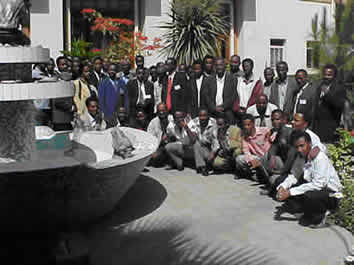|
|||
|
|
|
|
Roving Seminars - Ethiopia

The Agrometeorological Roving Seminar on the Application of Agro-Meteorology for increasing agricultural production was held from 16 to 17 May 2007 in Mekelle, Ethiopia. This seminar was the result of collaboration between the WMO and the National Meteorological Agency of Ethiopia (NMA) in how to deliver practical uses and knowledge of agro-meteorological applications to increase agricultural production, and to training agricultural extension agents and agricultural experts in providing better agro-meteorological services to farmers. In addition, it has been possible to share the successful experience and major lessons of the Mali agrometeorological pilot project with support of WMO and NMA, including sessions with the participants on how agro-meteorological service can directly reach farmers. The majority of the seminar participants were agricultural extension agents from the Tigray Regional State Agricultural and Rural Development Bureau. Other participants include agrometeorology and applied meteorology staff from the Mekelle Meteorological Branch Office of the NMA, from the NMA Head-quarter in Addis Ababa and from the ten other meteorological branch NMA offices in the country. There were 34 participants from the agricultural extension services, 11 farmers, and 18 regional representatives for a total of 63 participants. The main objective of the seminar was to show how farmers can benefit from the agro-meteorological advisories from the start of sowing activities to the time of harvest. The first day was spent on learning the experiences from Mali, based on four training presentations given by Mr Diarra. The four training presentations by Mr Diarra included: (i) Agro-Meteorological Extension service in Mali (ii) Basics of Agro-Meteorology Observation principles and important components of agro-meteorological service. (iii) The role of the farmers in Agro-meteorology observation and agro-meteorological advisories. (iv) The role of communication and Media in agro-meteorology extension service. The presentations focused on the involvement of the farmers in the measuring rainfall on their plots of land to aid them in decision-making regarding when to sow their crops, when to apply fertilizers, and also for the implementation of rain water harvesting. There was a lively discussion on how to make practical use of the Mali experience in Ethiopia. The uncertainty regarding the time of sowing was noted as one major problem facing the farmer over moisture deficient areas of Ethiopia. Lessons learned included: teamwork and good coordination between multi-disciplinary workers who give advice to farmers and good cooperation of the mass media. Training presentations given by the NMA staff included: i) Meteorological Forecast and Interpretation for agricultural activities; ii) Demonstration on how to use NMA’s Web-site to get different types of real time agro-meteorological data (as the web-site is updated every day); iii) Effective utilizations of climate data for agriculture taking Mekelle Meteorological station as one example; iv) Climate constraints and agro-meteorological advisories over drought vulnerable areas using Mekelle and Michew as examples; v) Application of moisture index in agro-meteorology monitoring and early warning. During the second day of the seminar the native Ethiopian Amharic language was used instead of English so that the participants could express their views freely. Participant recommendations were given in Amharic and these have been summarized into the following points: i) There was a general agreement that the seminar demonstrated the importance of agro-meteorological applications for agriculture. This type of training should be continuous and must involve more people so as to facilitate the implementation of agro-meteorological extension services; ii) There should be an improvement of forecasts that can be applicable directly to the local conditions, instead of being based on large areas; iii) Stronger team work and coordination is needed between meteorologists, agriculture personnel, and the media for the strengthening of agro-meteorological extension service to farmers; iv) There must be a system where real time data at meteorological stations can be available locally to the farmers, as requested; v) Agro-meteorological bulletins which are being distributed by the NMA and the meteorological branch offices should be accessible in terms of the language of communication and made easily interpreted so that they can directly reach the farmers; vi) Strengthening of the local meteorological branch offices is very important for delivering agro-meteorological service to the local farmers; vii) The mass media must give more attention to the dissemination of agro-meteorological advisories and information to farmers. |
|
|||||||||
 ©2019 WMO, 7bis, avenue de la Paix, CP No. 2300, CH-1211 Geneva 2, Switzerland - Tel.: +41(0)22 730 81 11 - Fax: +41(0)22 730 81 81 |
|||||||||||